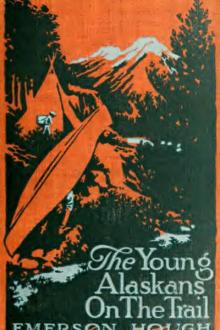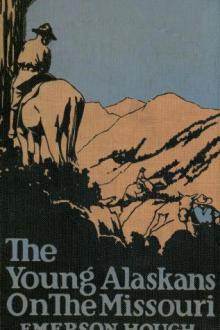Young Alaskans in the Far North by Emerson Hough (ereader android .txt) 📕

- Author: Emerson Hough
- Performer: -
Book online «Young Alaskans in the Far North by Emerson Hough (ereader android .txt) 📕». Author Emerson Hough
“Tuesday, July 22d.—We started about 10 o’clock this morning. Take turns on the line, each going as fast and as far as he can, until he gets pretty tired. Saw a coal seam in a cut rock wall on the bank. Mounted a series of heavy rapids all day. At 7 p.m. hit a cañon and had hard work to get up the rapids, for almost a mile. All worn out. Camp 8.30. Jesse plumb fagged out. Everybody wet. We dried our clothes around the fire before we went to bed. Can see how hard this would be for real tenderfeet. Found an old Klondike shack, fallen in, this afternoon, apparently deserted nearly twenty years. Caught some splendid Arctic trout on the fly—the gamest fish we ever saw, and mighty good to eat. They look like sea-trout, although they are a hundred and fifty miles from the sea here. Our camp in a round pocket to-night. The cañon bends sharp to the right. Can see one mountain ahead, but not the big range. John making a map all the time. Stories told us no use this far; things don’t check out.
“Wednesday, July 23d.—Off at 10.30. Much to our joy, have fine tracking nearly all day. Rapids less powerful, and bends wider, and better beaches to walk on. At 6.30 passed a small creek and explored it. Nowhere near summit yet. We thought we logged twelve miles to-day. Probably haven’t averaged half that the other three days. It looks mighty puzzling on ahead. They told us to look out for a sharp, high peak which marked the portage. We can’t figure it out. They told us to look for a river coming from the right. We don’t find one. We seem a long way from the summit. Camp 9.30 on rocky flat. Trout and grayling both for supper. Very fine.
“Thursday, July 24th.—Haven’t slept very well. Everybody getting sore and tired. Don’t think we went over four or five miles all day to-day. Uncle Dick called it ‘unmitigated hell.’ Water icy cold now and very fast and heavy. A great many round, smooth stones in the river, so we can hardly walk. Our shoes are worn out, and we are only wearing double moccasins, so that our feet can hardly stand it. Uncle Dick fell down once and hurt his leg pretty bad. An accident might happen any time. The Indian boys are tired but game. When we asked them how far to the top they said, ‘I dinno,’ which is about all the English they have. Current getting worse and worse, and the bad part is that the water is so shallow that in places it is hard to get even our light canoe through. We have to make crossings, and then there is risk of the boat swinging down and pulling us off our feet. I suppose a fellow would drown with the track-line around him. Mighty hard work. At nine o’clock the two Indian boys all in, and had to stop. At ten I went up with Uncle Dick to explore. A river came from the right, so we thought this was the junction of which they told us at McPherson. Went back and got the rest and camped here about midnight. Tundra under the trees. Couldn’t drive tent-pegs for ice. A bad camp. Everybody tired.
“Here we found the Summit Tree, not far from the beach. It says: ‘Summit Tree. Please register.’ Many names under date of 1898. Couldn’t read all of them. A grizzly had registered on this tree, too—scraped the bark off high up. Some names we saw were Watt, Goldheim, Marks, Jones, etc. As is the custom, we cut our names in, too, with the date, so that others might see them. We slashed down the brush to the water so that any others coming in now might see this tree easier and so know where they were. If we had not found this tree we would not have been sure we had reached the summit. Well, we are mighty glad, anyhow. Wet and tired, but pretty confident. Not much grub. Some rapids!
“Friday, July 25th.—So tired we slept late. Everybody stiff. Took the left-hand creek that comes in here, and had a hard pull over a little cataract. This should be called Summit Creek. It doesn’t seem to have any name. It runs narrow, and fringed with alders. Very crooked. Saw some jack-snipe and a robin to-day, up here on the summit of the Rockies, almost at the Arctic Sea and above the Arctic Circle!
“We had to drop the line in the brush here and use paddle and pole. Went for an hour and a half and then could see lake on the right. Small creek coming in. Another lake ahead. Everything was blank. It looked like a big country and we had no map. John set down everything as we found it out for ourselves. We climbed the foot-hills to look about. Of course we wanted to find the headwaters of the Bell River, or rather the Little Bell, which runs into the Big Bell, and then into the Porcupine, which runs into the Yukon, but we did not know which gap held the headwaters of the Bell. On the left we saw a chain of little lakes, four or five of them. Supposed there might be channels, so bore to left toward these lakes. We’re now on a flat country high up, with rock walls far away on either side and mountains on ahead. We are on the tundra now. It is broken up into humps. The French call them ‘têtes des femmes,’ or ‘woman heads,’ because of the long grass that hangs down from the top. Mighty hard to walk over. There is a land portage from Fort McPherson to the summit. A Catholic priest has made it, and he used snow-shoes on these ‘woman heads,’ although there was no snow. A man could hardly walk in any other way.
“We left two lakes to the right, followed the creek, and came to an old landing. Camped at 6 p.m. to eat. Instead of two lakes up here there are five! We don’t know where we are going, but are hanging to our creek. Signs of a portage other side of the lake, so guess we are on the right trail. This is a blind pass. Some danger, I suppose. We are not scared. We all hang together, because any one left here would be helpless.
“Saturday, July 26th.—Flies not so bad. Tried out our creek farther and came into third small lake. Cut a portage into next lake. The creek is very blind—wanders around through the willows and grass. Jesse and John got away for an hour or two to-day, and were lost; they went to the right where we thought the channel ran, but it didn’t go there. Everybody much scared. The last portage is on ahead, six hundred yards from Summit Lake to Loon Lake. Everybody seems to forget these other little lakes, which are confusing. We see signs of old ax-work, so think we must be on the trail. The Hudson’s Bay people have used this in the past as well as the Klondike outfits. These latter people must have had an awful time getting over.
“The whole country of the Rat and the country on the summit in this pass may be called altogether new and unknown to any one. We had to find it as much as if no one had ever been there before, except one or two places we saw where men had been. There is no map of it. Now we have made two short portages and one long portage in getting to Loon Lake; and Loon Lake, we are pretty sure, drains into the headwaters of the Bell River.
“This creek is so shallow we have to drag our boat across the tundra. Willy had gone on ahead, and says he has found the Bell River. It is not anywhere near where we thought it was. I thought the pass lay far off to the right. Opposite our camp on Loon Lake there is a ‘sharp, high peak,’ all right, and this no doubt is the one the traders told us about. The trouble is when you say ‘sharp, high peak’ you may see any one of fifty which you think is the right one, and it may be wrong.
“Found the new creek, which we think is the Little Bell, down a deep bank. Plenty of water and plenty of current. It looks as if it ran back into the mountains fifteen or twenty miles. No one knows anything about it. No one knows anything about this country at all. We call ourselves explorers as much as anybody. I am pretty sure now that this is the right ‘sharp, high peak.’ There was a trader by name of Charles Camsell came across here, and he made a sort of map. The government maps only guess at this as far as they try to describe it.
“I think it is risky to depend on loose talk of a new country like this. They told us there were only two portages and two lakes, but I have counted eleven lakes and ponds on the summit of the Rockies here. We really crossed five lakes, counting in Loon Lake, and we made two short creek portages, one long lake-to-lake portage, and one long lake-to-river portage—the five-hundred-yards drag into the Little Bell. I think this is accurate. John has it all down on his map this way. Many ptarmigan. Plenty of rabbits. The Bell River full of grayling. Never saw the like.
“Our Indian boys left us to-day. They are going back home by themselves. They have a rifle and we have given them a few beans and a little flour and a small piece of bacon—all we can spare. Uncle Dick paid them well. They have helped out very much. Without them I don’t know whether we boys could have got the boat up the Rat or not. It was mighty rough, mean work, I can say that. John and Jesse helped all they could, and so did we all. Well, here we are at the summit.
“The Midnight Sun is gone now—there was a sunset to-night. We got to bed about 12 o’clock midnight. Sorry to have the Indian boys go back, as they were cheerful, fine chaps. They say we are all right now, and that this river runs to the Porcupine. I would rather trust an Indian than a Klondiker in getting across country.
“We are getting so we don’t like rabbits very much. The ptarmigan and grayling still taste good. Our new river is full of grayling, and we have explored it a little bit. It is fine up here in the mountains. John and Jesse and I feel that this is the greatest trip we ever had, or that anybody could have in this country. We feel more alone here than in any place we have ever been in all our lives.
“We now think we can get through.”
Rob’s journal and John’s map later proved most prized possessions of our young explorers, so they were glad they kept them up, although it ever was rather unwelcome work to sit in a cramped-up tent, or out in the air among the mosquitoes, and write or draw for a long time while still tired and wet. Both of them, however, persisted till the end, and later did not regret it.
XIII DOWN THE PORCUPINE“
I’m awfully tired, Uncle





Comments (0)